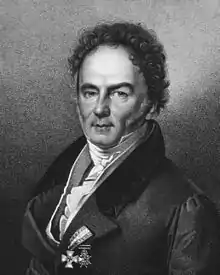Adam Elias von Siebold
Adam Elias von Siebold (5 March 1775, Würzburg – 12 June 1828, Berlin) was a German Gynecologist.
Adam Elias von Siebold | |
|---|---|
 | |
| Born | 5 March 1775 |
| Died | 12 June 1828 (aged 53) |
| Scientific career | |
| Fields | Gynecology |
Life
He was the youngest son of Carl Caspar von Siebold (1736–1807). Siebold was professor of anatomy, surgery und midwifery of the University of Würzburg. Unlike his brothers, he originally wanted to become a Merchant, eventually, however, he began to study medicine.
Through his teachings he influenced Johann Christian Stark (1753–1811) in Jena, Friedrich Benjamin Osiander (1759–1822) in Göttingen and later, Johann Lukas Boër (1751–1835) in Wien.
He authored several textbooks and is attributed to the following quote: Peace and silence, time and patience, respect for nature and the bithgiving woman, and the art of waiting, when Mother Nature rules.[1]
He died aged 53 of a stomach condition. He was survived by two sons and four daughters, amongst them the doctor and Zoologist Karl Theodor Ernst von Siebold (1804–1885).
Selected works
- Ausführliche Beschreibungen der Heilquellen zu Kissingen und ihre Auswirkung besonders bei Frauenzimmerkrankheiten, 1828, .
Legacy
The Siebold-Gymnasium in Würzburg is named after him.
Notes
- Translation of Stille und Ruhe, Zeit und Geduld, Achtung der Natur und dem gebärenden Weibe, und der Kunst Achtung, wenn ihre Hülfe die Natur gebietet
Sources
This article (incomplete) is based on the German and Swedish wiki pages (4 Sept 2008)
External links
- Adam Elias von Siebold in the German National Library catalogue
- Biografie
- "Adam Elias von Siebold", Allgemeine Deutsche Biographie (ADB) (in German), vol. 34, Leipzig: Duncker & Humblot, 1892, pp. 183–184
- Literaturliste im Online-Katalog der Staatsbibliothek zu Berlin
![]() This article contains content from the Owl Edition of Nordisk familjebok, a Swedish encyclopedia published between 1904 and 1926, now in the public domain.
This article contains content from the Owl Edition of Nordisk familjebok, a Swedish encyclopedia published between 1904 and 1926, now in the public domain.